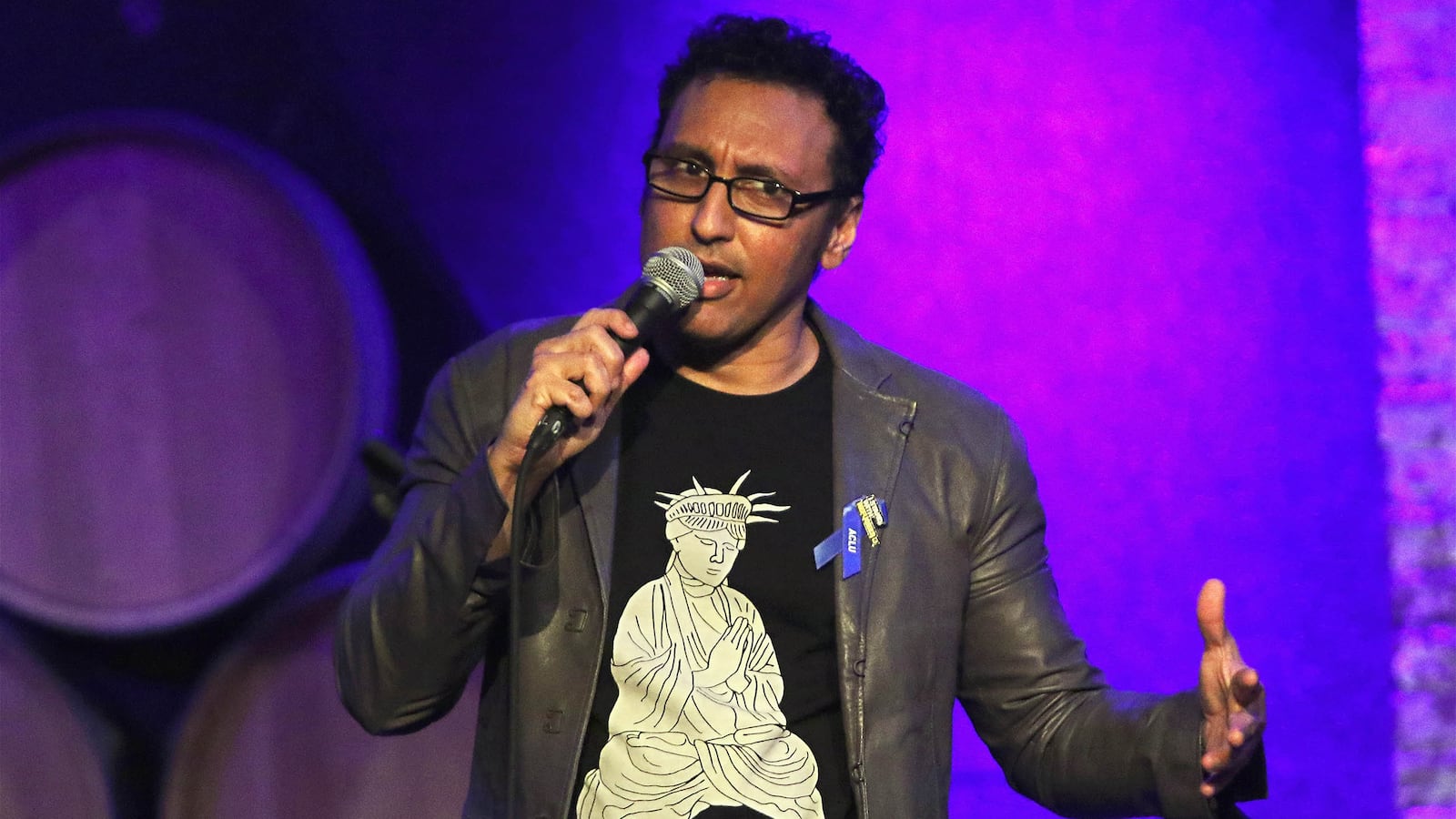Twenty years ago, when Aasif Mandvi wrote and starred in a one-person play about an Indian-American immigrant family, it was considered novel, lighthearted fare.
“It almost felt like I was introducing the American theatre audience to the story of Indian Americans,” Mandvi told The Daily Beast. A lot has happened since 1998.
Mandvi is currently starring in a return engagement of that play, Sakina's Restaurant, produced by Audible at the Minetta Lane Theatre, through November 11. “Today the show is still funny,” Mandvi says, “but it’s also heartbreaking in a way, because we see an America that we have lost.”
The 52-year-old actor, best known for his decade on The Daily Show as “Senior Foreign Looking Correspondent” and similar assignations, wrote the play partly to give himself roles to perform.
“Nobody was telling any stories representative of me,” says Bombay-born Mandvi, who migrated with his family to England as an infant, and to Florida at 16. The play was rejected by nearly every theatre in town (“people were like, ‘Nobody will want to come see this play about a bunch of Indian characters’”), until his acting teacher at the American Place Theater agreed to put it on.
Sakina’s Restaurant follows a hopeful young immigrant named Asgi on his foray into America, where he finds work in an Indian restaurant on East 6th Street in Manhattan.
The owner and his family form a constellation of supporting characters, each with their own distinct perspective on life as an Indian American, all wonderfully brought to life by Mandvi. With warmth and wit, the play lends a human face to the emotional impact of living between cultures — displacement, loneliness, the pressures of opportunity, and the melancholy of feeling less than whole and out of place.
That initial off-Broadway run preceded 9/11, the presidency of George W. Bush, and the rapid expansion of the internet by a few crucial years. “The humanizing of immigrants makes our heart break today,” Mandvi said. “It didn’t back then, because there wasn’t the same politicization and dehumanization going on in the late ‘90s.”
The actor, who helped raise $100K for the ACLU with Aasif Mandvi’s Deportation Jamboree after the first ban on immigration from Muslim countries last year, agreed the timing was right to revive the play when Audible approached him with the idea.
The Amazon subsidiary will also release Sakina’s Restaurant as an audio play, vastly expanding its potential audience. “This is an American story about an American family, about human beings,” Mandvi said. “The play by virtue of itself is non-political. It’s about humanity.”
But context is everything. The play now seems to counter nostalgia for a whiter America with nostalgia for a time when immigrating here still seemed like a dream.
“I came to this country with a wide-eyed wonderment,” Mandvi said. “Asgi is an exaggerated version of me… [and he] wouldn’t be allowed to come here today.” Not only does an open-door America feel like a thing of the past, so too do immigrants who idealized coming here. “I had grown up as a little kid on a diet of American pop culture,” Mandvi said. “Like it says in the play, I thought we were coming to Disney World. Nobody thinks of America in that way anymore, I don’t think.”
Audiences have been reaching out to Mandvi, online and in person, sharing how the story has resonated with them. “There are people who feel like by virtue of its non-politicalness it’s a political act and it is a ‘fuck you’ to Trump,” Mandvi said. “Then there are other people like yourself or me, Indian Americans. A young woman came up to me after the show and said, ‘Thank you for helping me understand my father a little bit better.’ That was really powerful for me.”
Mandvi also recalled a woman who told him she’d struck up a conversation with an Indian immigrant working in her local diner, asking about his wife and what brought him to this country. “That I felt like was very inspiring, like that’s what art can do.”
Anecdotes like these are a testament to the power of representation, an area where strides have admittedly been made since Mandvi penned Sakina’s Restaurant to give himself worthwhile characters to play.
“There’s an active energy toward having people represented a lot more in television and film,” Mandvi said, while pointing out that white stories are still the norm. “White people still get to tell stories that are about everyday things,” he says. “When it comes to brown people, black people, or Asians, it has to be like some incredible thing that happened; they have to crazy, they have to rich, they have to be the best or the worst.”
Mandvi also points to the industry’s resistance to multiplicity, in assuming one minority point of view stands in for all. “When you’re a minority, you’re immediately compared to the other thing that’s like that,” Mandvi said. “If I did a show about my dating life and being an actor, immediately people would be like, ‘Master of None is the same thing.’ We don’t get seen as individuals with different stories.”
That same logic underlies frequent rhetoric casting immigrants as caravans, armies, or hordes—a failure to see them simply as people with their own subjectivity.
With Sakina’s Restaurant and his work as an activist, Mandvi hopes to do his part in countering xenophobic narratives that cast immigrants as villains. “We all know the kind of lunacy that is coming out of the White House... All you can do in those situations is make fun of those people,” he said.
“You see that in cultures in more repressive regimes. It’s what Bassem Youssef was doing in Egypt with his show, or what people have done in Iran or other places where you have oppressive regimes and they speak out through art.”
“The role of comedy is to do what it’s always done—on one hand lift up the mirror and show us the absurdity of what we’re living through in a cathartic way… The other way to do it is to say, ‘I’m not talking about that, let’s go over here and do fart jokes.’ Because god knows we need fuckin’ fart jokes right now,” he said. “That’s what comedy can do as well; it’s a place where we can go and laugh and let go of the tension and the anger for a little while.”
Sakina's Restaurant is at the Minetta Lane Theatre, NYC, through November 11.







